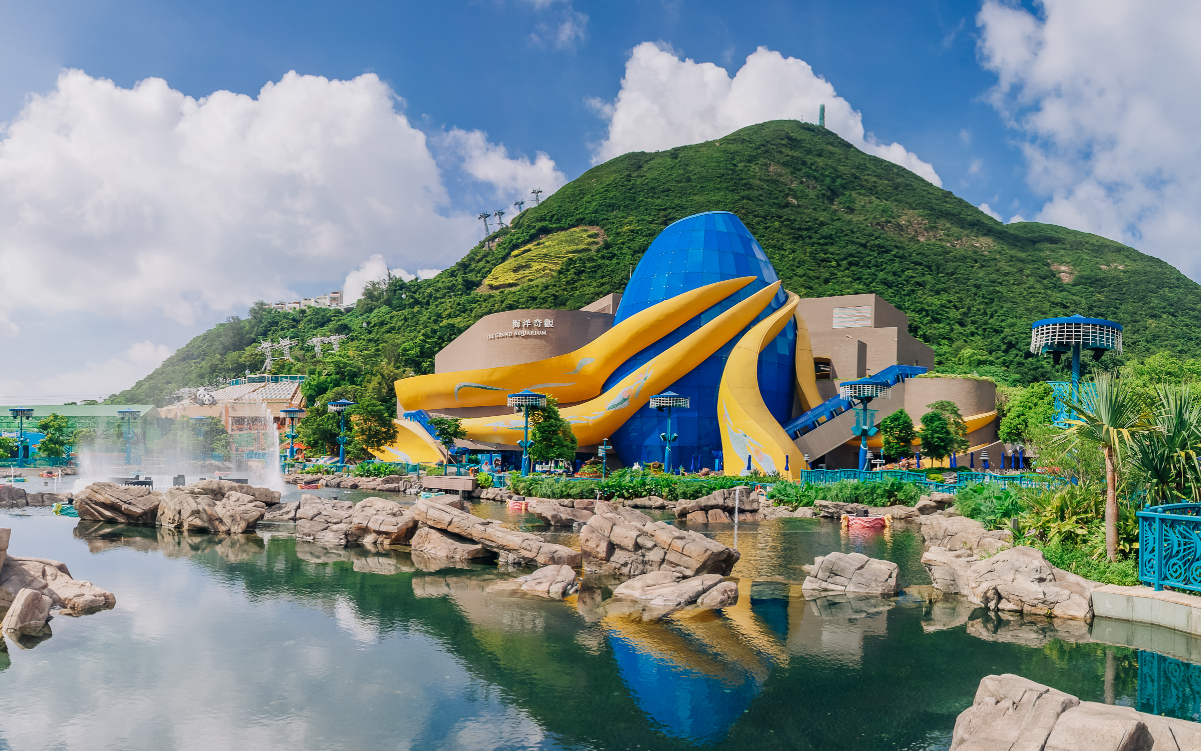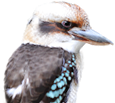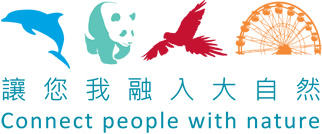Jelajahi Ocean Park.
Giant pandas An An and Ke Ke, gifted by the Central Government to the Hong Kong Special Administrative Region, have now settled into Ocean Park for a week. Currently undergoing quarantine at the Hong Kong Jockey Club Sichuan Treasures, the two giant pandas are under close monitoring by the Park's animal care team.
Under the leadership of Howard Chuk, Head of Zoological Operations and Conservation at Ocean Park Corporation, the animal care team including Philip Wong, General Curator of Zoological Operations and Conservation; Matt Leung, Assistant Curator; Mandy Tang, Assistant Curator; Kevin Wu, Senior Supervisor; and Wing Lau, Animal Care Specialist, has been caring diligently for An An and Ke Ke since their arrival in Hong Kong. The team had put considerable effort into organising the transportation logistics for the pandas and thoughtfully designed their new habitat at Ocean Park to ensure a smooth transition.
"The two giant pandas are in good shape. Both our team and experts from the Conservation and Research Centre for the Giant Panda (CCRCGP) believe their adaptation to the new environment is progressing well. We will gradually introduce training activities and environmental enrichment for An An and Ke Ke, helping them adjust to their new home and familiarise themselves with our caretakers and animal care routines," said Chuk.
In mid-July, Assistant Curator Matt Leung travelled to Sichuan to meet An An and Ke Ke at the Dujiangyan Base of the CCRCGP. He shared that the animal care team at the Park converse with the pandas mainly in Cantonese. This will help An An and Ke Ke recognise the voices of their caregivers during everyday interactions – an approach intended to strengthen bond and build trust. When summoning the pandas, the team uses Mandarin for An An and the Sichuan dialect for Ke Ke, as the pandas are already familiar with these sounds. Looking ahead, the Ocean Park team plans to introduce trilingual commands in Cantonese, Mandarin and English during training sessions.
When asked whether the pandas would recognise their new names in the future, Leung explained that once the new names have been selected, both the old and new names would be used concurrently during training, alongside positive encouragement to help them become familiar with their new identities. He believes that, given time, An An and Ke Ke will adapt.
Leung also noted that during their journey to Hong Kong, the pandas showed considerable curiosity about their surroundings. Thanks to prior training, the process of entering and exiting the transport crates went smoothly, and the pair responded well when being called by name.
Assistant Curator Mandy Tang said that although she did not have the chance to interact with An An and Ke Ke before their arrival, the team had maintained close communication, allowing each member to understand the pandas' personalities. With the team's extensive experience in panda care, they are confident that An An and Ke Ke will quickly adjust to their new environment.
Currently, An An and Ke Ke are fed four times a day at Ocean Park and have got used to eating bamboo sourced from Guangdong, which now constitutes 60–70% of their bamboo consumption, compared to 30–40% previously. The animal care team is also conducting basic training to strengthen connection with the pandas through verbal communication. The training will be progressive by gradually guiding the pandas to designated areas and teaching them specific actions. This would enable the team to perform more animal care tasks, such as measuring blood pressure, taking blood samples and conducting ultrasound scans.
Regarding the care process, Tang explained that as adult giant pandas are large and possess strong claws and powerful bite strength, the team must ensure a safe environment during feeding and care. Similar to other panda facilities in China and around the world, the Park implements a "protected contact" method, allowing interaction with the adult pandas under controlled conditions.
The “panda nannies” are overjoyed to see the number of pandas increasing from two to six. Leung expressed his eagerness to meet Ying Ying, Le Le, and the pair of twins, having not interacted with them for several months. Tang shared that after caring previously for the late An An and Jia Jia, she felt a sense of loss when only two pandas remained. She is therefore thrilled with the arrival of the new pandas and is confident that the team's rich experience will ensure they receive exceptional care.
Participate in the Giant Panda Naming and Painting Competitions
Ocean Park invites the public to participate in the Giant Panda Naming Competition organised by the Culture, Sports and Tourism Bureau and co-organised by Ocean Park. From now until 27 October 2024, Hong Kong residents can propose meaningful names to reflect the characteristics of the two pandas, along with an explanation of their meanings in no more than 100 Chinese characters, to welcome them to their new home in Hong Kong. Participants could also suggest keeping the pandas' original names with an explanation of why this should be the case.
Meanwhile, the Giant Panda Painting Competition will accept submissions of hand-drawn artwork from 21 October to 8 November. The competition will be divided into three categories: Open Group (Hong Kong residents), Secondary Student Group (Secondary One to Secondary Six students), and Primary Student Group (Primary One to Primary Six students). All Hong Kong residents are encouraged to depict the pandas' charming nature, using photos and videos as reference with an explanation of no more than 100 Chinese characters about their artwork.
For details regarding the two competitions, please visit: https://www.oceanpark.com.hk/en/park-experience/giant-panda-campaign-2024/naming-competition-2024
Under the leadership of Howard Chuk, Head of Zoological Operations and Conservation at Ocean Park Corporation, the animal care team including Philip Wong, General Curator of Zoological Operations and Conservation; Matt Leung, Assistant Curator; Mandy Tang, Assistant Curator; Kevin Wu, Senior Supervisor; and Wing Lau, Animal Care Specialist, has been caring diligently for An An and Ke Ke since their arrival in Hong Kong. The team had put considerable effort into organising the transportation logistics for the pandas and thoughtfully designed their new habitat at Ocean Park to ensure a smooth transition.
"The two giant pandas are in good shape. Both our team and experts from the Conservation and Research Centre for the Giant Panda (CCRCGP) believe their adaptation to the new environment is progressing well. We will gradually introduce training activities and environmental enrichment for An An and Ke Ke, helping them adjust to their new home and familiarise themselves with our caretakers and animal care routines," said Chuk.
In mid-July, Assistant Curator Matt Leung travelled to Sichuan to meet An An and Ke Ke at the Dujiangyan Base of the CCRCGP. He shared that the animal care team at the Park converse with the pandas mainly in Cantonese. This will help An An and Ke Ke recognise the voices of their caregivers during everyday interactions – an approach intended to strengthen bond and build trust. When summoning the pandas, the team uses Mandarin for An An and the Sichuan dialect for Ke Ke, as the pandas are already familiar with these sounds. Looking ahead, the Ocean Park team plans to introduce trilingual commands in Cantonese, Mandarin and English during training sessions.
When asked whether the pandas would recognise their new names in the future, Leung explained that once the new names have been selected, both the old and new names would be used concurrently during training, alongside positive encouragement to help them become familiar with their new identities. He believes that, given time, An An and Ke Ke will adapt.
Leung also noted that during their journey to Hong Kong, the pandas showed considerable curiosity about their surroundings. Thanks to prior training, the process of entering and exiting the transport crates went smoothly, and the pair responded well when being called by name.
Assistant Curator Mandy Tang said that although she did not have the chance to interact with An An and Ke Ke before their arrival, the team had maintained close communication, allowing each member to understand the pandas' personalities. With the team's extensive experience in panda care, they are confident that An An and Ke Ke will quickly adjust to their new environment.
Currently, An An and Ke Ke are fed four times a day at Ocean Park and have got used to eating bamboo sourced from Guangdong, which now constitutes 60–70% of their bamboo consumption, compared to 30–40% previously. The animal care team is also conducting basic training to strengthen connection with the pandas through verbal communication. The training will be progressive by gradually guiding the pandas to designated areas and teaching them specific actions. This would enable the team to perform more animal care tasks, such as measuring blood pressure, taking blood samples and conducting ultrasound scans.
Regarding the care process, Tang explained that as adult giant pandas are large and possess strong claws and powerful bite strength, the team must ensure a safe environment during feeding and care. Similar to other panda facilities in China and around the world, the Park implements a "protected contact" method, allowing interaction with the adult pandas under controlled conditions.
The “panda nannies” are overjoyed to see the number of pandas increasing from two to six. Leung expressed his eagerness to meet Ying Ying, Le Le, and the pair of twins, having not interacted with them for several months. Tang shared that after caring previously for the late An An and Jia Jia, she felt a sense of loss when only two pandas remained. She is therefore thrilled with the arrival of the new pandas and is confident that the team's rich experience will ensure they receive exceptional care.
Participate in the Giant Panda Naming and Painting Competitions
Ocean Park invites the public to participate in the Giant Panda Naming Competition organised by the Culture, Sports and Tourism Bureau and co-organised by Ocean Park. From now until 27 October 2024, Hong Kong residents can propose meaningful names to reflect the characteristics of the two pandas, along with an explanation of their meanings in no more than 100 Chinese characters, to welcome them to their new home in Hong Kong. Participants could also suggest keeping the pandas' original names with an explanation of why this should be the case.
Meanwhile, the Giant Panda Painting Competition will accept submissions of hand-drawn artwork from 21 October to 8 November. The competition will be divided into three categories: Open Group (Hong Kong residents), Secondary Student Group (Secondary One to Secondary Six students), and Primary Student Group (Primary One to Primary Six students). All Hong Kong residents are encouraged to depict the pandas' charming nature, using photos and videos as reference with an explanation of no more than 100 Chinese characters about their artwork.
For details regarding the two competitions, please visit: https://www.oceanpark.com.hk/en/park-experience/giant-panda-campaign-2024/naming-competition-2024







